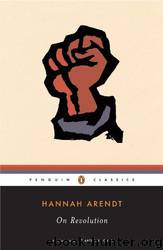On Revolution (Penguin Classics) by Hannah Arendt

Author:Hannah Arendt [Arendt, Hannah]
Language: eng
Format: epub, azw3
Tags: History, World, Politics & Social Sciences, Philosophy, Political, Politics & Government, Political Science, History & Theory, Revolutionary
ISBN: 9781101662649
Amazon: B00HUVUJ8K
Publisher: Penguin Classics
Published: 2006-09-26T05:00:00+00:00
CHAPTER FIVE
FOUNDATION II: NOVUS ORDO SAECLORUM
Magnus ab integro saeclorum nascitur ordo.
—Virgil
1
Power and authority are no more the same than are power and violence. We have hinted already at the latter distinction, which, however, we now must recall once more. The relevance of these differences and distinctions becomes especially striking when we consider the enormously and disastrously different actual outcomes of the one tenet the men of the two eighteenth-century revolutions held in common: the conviction that source and origin of legitimate political power resides in the people. For the agreement was in appearance only. The people in France, le peuple in the sense of the Revolution, were neither organized nor constituted; whatever ‘constituted bodies’ existed in the Old World, diets and parliaments, orders and estates, rested on privilege, birth, and occupation. They represented particular private interests but left the public concern to the monarch, who, in an enlightened despotism, was supposed to act as ‘a single enlightened person against many private interests’,1 whereby it was understood that in a ‘limited monarchy’ these bodies had the right to voice grievances and to withhold consent. None of the European parliaments was a legislative body; they had at best the right to say ‘yes’ or ‘no’; the initiative, however, or the right to act did not rest with them. No doubt the initial slogan of the American Revolution, ‘No taxation without representation’, still belonged in this sphere of ‘limited monarchy’ whose fundamental principle was consent of the subjects. We have difficulties today in perceiving the great potency of this principle because the intimate connection of property and freedom is for us no longer a matter of course. To the eighteenth century, as to the seventeenth before it and the nineteenth after it, the function of laws was not primarily to guarantee liberties but to protect property; it was property, and not the law as such, that guaranteed freedom. Not before the twentieth century were people exposed directly and without any personal protection to the pressures of either state or society; and only when people emerged who were free without owning property to protect their liberties were laws necessary to protect persons and personal freedom directly, instead of merely protecting their properties. In the eighteenth century, however, and especially in the English-speaking countries, property and freedom still coincided; who said property, said freedom, and to recover or defend one’s property rights was the same as to fight for freedom. It was precisely in their attempt to recover such ‘ancient liberties’ that the American Revolution and the French Revolution had their most conspicuous similarities.
The reason why the conflict between king and parliament in France resulted in such an altogether different outcome from the conflict between the American constituted bodies and the government in England lies exclusively in the totally different nature of these constituted bodies. The rupture between king and parliament indeed threw the whole French nation into a ‘state of nature’; it dissolved automatically the political structure of the country as well as the
Download
On Revolution (Penguin Classics) by Hannah Arendt.azw3
This site does not store any files on its server. We only index and link to content provided by other sites. Please contact the content providers to delete copyright contents if any and email us, we'll remove relevant links or contents immediately.
The Secret History by Donna Tartt(16662)
The Social Justice Warrior Handbook by Lisa De Pasquale(11494)
Thirteen Reasons Why by Jay Asher(7803)
This Is How You Lose Her by Junot Diaz(5800)
Weapons of Math Destruction by Cathy O'Neil(5046)
Zero to One by Peter Thiel(4835)
The Myth of the Strong Leader by Archie Brown(4796)
Promise Me, Dad by Joe Biden(4456)
Beartown by Fredrik Backman(4434)
Stone's Rules by Roger Stone(4423)
How Democracies Die by Steven Levitsky & Daniel Ziblatt(4414)
The Fire Next Time by James Baldwin(4351)
100 Deadly Skills by Clint Emerson(4086)
A Higher Loyalty: Truth, Lies, and Leadership by James Comey(4041)
Rise and Kill First by Ronen Bergman(4021)
The David Icke Guide to the Global Conspiracy (and how to end it) by David Icke(3891)
The Farm by Tom Rob Smith(3878)
Secrecy World by Jake Bernstein(3789)
The Doomsday Machine by Daniel Ellsberg(3737)
